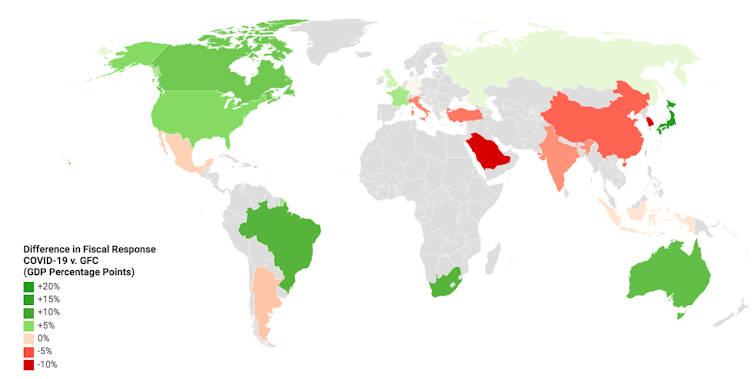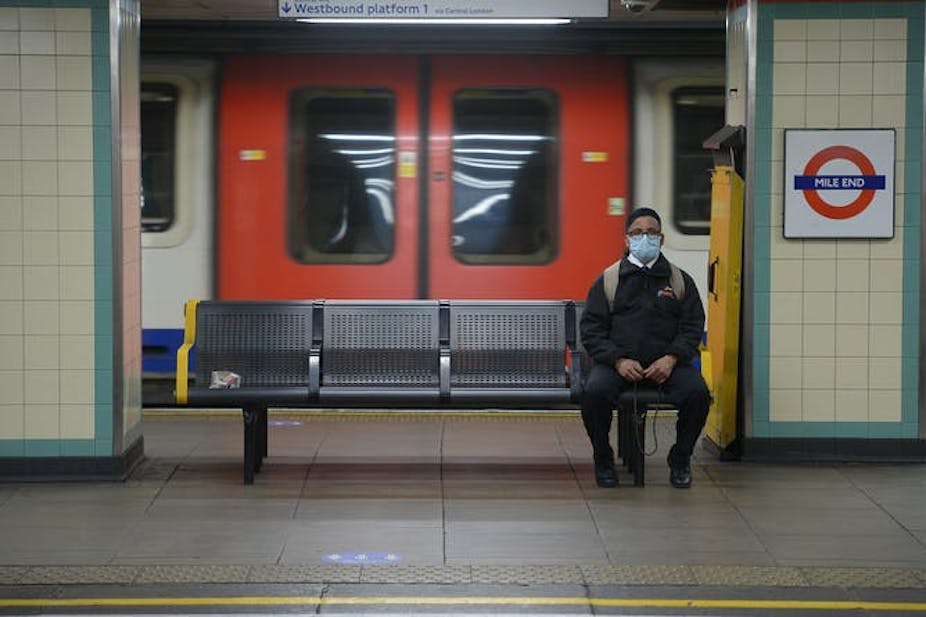The world continues its struggle against the COVID-19 pandemic. More than 7.4 million cases and 416,000 deaths have been reported worldwide. The United States has the largest number of cases in the world, surpassing the 2 million mark as it reopens businesses while still trying to contain the spread of the virus.
Saving the economy and tackling the health crisis cannot be done at the same time. Research from around the globe shows that. It is a grim reality as an economic downturn leads to unemployment and reduces the welfare of the people. The poor will always be the hardest hit.
However, there is always light at the end of the tunnel, and we can still hope we can achieve something positive at the end of the pandemic. Some view this as the right time to improve things, from improving the food system in Africa to forcing us to design healthier buildings.
In this week’s round-up of coronavirus stories from scholars around the globe, we explore the disproportionate impacts of COVID-19 and the latest on drug trials.

This is our weekly roundup of expert info about the coronavirus.
The Conversation, a not-for-profit group, works with a wide range of academics across its global network. Together we produce evidence-based analysis and insights. The articles are free to read – there is no paywall – and to republish. Keep up to date with the latest research by reading our free newsletter.
The havoc continues
The pandemic continues to take its toll on various fronts, from taking thousands of lives to devastating economies and the welfare of many people worldwide.

Rising death toll. There is no doubt the UK has been hit hard by coronavirus. The nation has the second-largest number of deaths worldwide, trailing only the USA, which has five times the population. An expert in mathematical modelling, Jasmina Panovska-Griffiths explains where the UK went wrong and how will it prevent further deaths if a secondary wave of infections occurs as it reopens.
Hard impact. Who has been hit hardest by South Africa’s lockdown? Three researchers from the International Food Policy Research Institute (IFPRI), Channing Arndt, Sherman Robinson and Sherwin Gabriel, used an economic modelling tool called SAM-multiplier analysis (Social Accounting Matrix), which is well suited to assessing short-term shocks to an economy, to find the answers.
Big debts. The macroeconomic shock to the world economy from the COVID-19 pandemic is arguably unprecedented in modern times. The financial response by governments of the major economies has been substantial. Anton Muscatelli, an economist and Principal of the University of Glasgow, explains why paying for coronavirus will have to be like war debt – spread over generations.
Fiscal interventions COVID-19 versus Global Financial Crisis

Solving Indonesia’s health-care problems. The COVID-19 pandemic is expected to increase the deficit of the agency managing Indonesia’s national health insurance – known as BPJS-Kesehatan – which had already reached US$1.9 billion. To support the agency, the government plans to increase national health insurance premiums. However, a panel of experts argues this will not solve Indonesia’s health-care problems.
Funding the stimulus The US Federal Reserve has vowed to provide up to US$2.3 trillion in lending to support households, employers, financial markets and state and local governments that are struggling as a result of the coronavirus and stay-at-home orders. William J. Luther, an expert in economics at Florida Atlantic University, writes about how the Federal Reserve literally makes money to provide the support.
Encouraging changes
The global pandemic also arguably can bring about or force positive changes in many aspects of our lives.
Food security. The World Food Program has warned that the COVID-19 pandemic could cause one of the worst food crises since the second world war. It predicts a doubling of the number of people going hungry – more than half of them in sub-Saharan Africa. A panel of experts argues that the COVID-19 recovery is a chance to improve the African food system.
Healthy building. The COVID-19 pandemic will force us to design and engineer buildings for better health. As research shows 85% of our time is spent indoors, we are the main source of bacteria in indoor environments. Healthy building expert Jako Nice writes about this issue in his article The new architectural frontier: buildings and their microbiomes.
Safer space. The COVID-19 pandemic has also forced governments to weigh the benefits of keeping green spaces open against the public health concerns arising from their use. Green spaces have positive effects on mental health, physical fitness, social cohesion and spiritual wellness, but many are locked off for the safety of the people. In this regard, a group of experts explains how cities can add accessible green space in a post-coronavirus world.
Health-care revolution. Around the world, barriers to providing health care remotely – known as “telemedicine” – have come down overnight. COVID-19 has moved us from a cautious debate about whether to use telemedicine to an immediate need to revolutionise practice. Three experts from the University of Bath, Christopher Eccleston, Edmund Keogh and Emma Fisher, explain how the coronavirus has forced us to embrace digital health care.
The quest for a cure
A vaccine for the coronavirus is yet to be found and there are many drug tests and controversies around it.

The truth about hydroxychloroquine. US President Donald Trump said last May he was taking hydroxychloroquine to avoid contracting COVID-19. News media reports run the gamut from saying hydroxychloroquine is 91% effective to it being both ineffective and dangerous. How do people know what to believe? A pharmacy expert from the University of Connecticut, C. Michael White, writes a new review of several studies finds flaws in research and no benefit.
Looking beyond spike proteins. Developing a vaccine is difficult at the best of times, but rarely have we been in a situation where basic knowledge about a virus has to be acquired so directly alongside the race to eradicate it. Two experts from the University of Manchester, Sheena Cruickshank and Daniel M. Davis, explain how T cells are involved and what it might mean for vaccine development.

- The good bacteria. Scientists around the world are continuing to test countless vaccines and drugs in the hope of finding effective ways to prevent and treat COVID-19. Among the drugs being trialled in Australia is something called OM85. It is not a conventional drug, but a combination of molecules extracted from the walls of bacteria that commonly cause respiratory infections. An expert from The University of Queensland, Peter Sly, writes about how bacteria in a capsule could protect us from coronavirus and other respiratory infections.
Get the latest news and advice on COVID-19 direct from the experts in your inbox. Join hundreds of thousands who trust experts by subscribing to our newsletter.
This article is supported by the Judith Neilson Institute for Journalism and Ideas.



